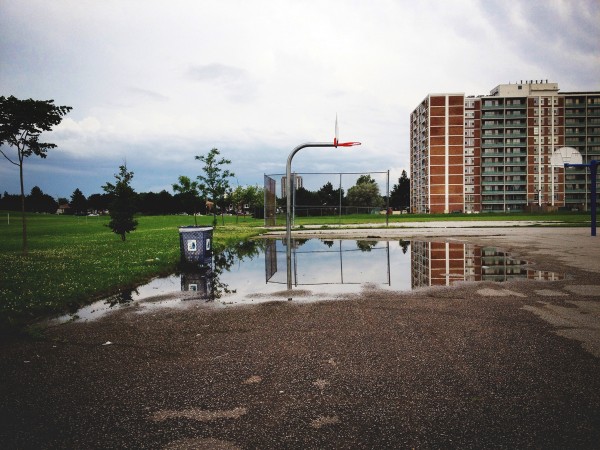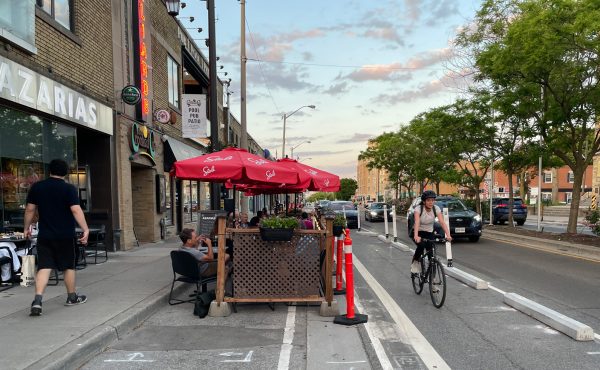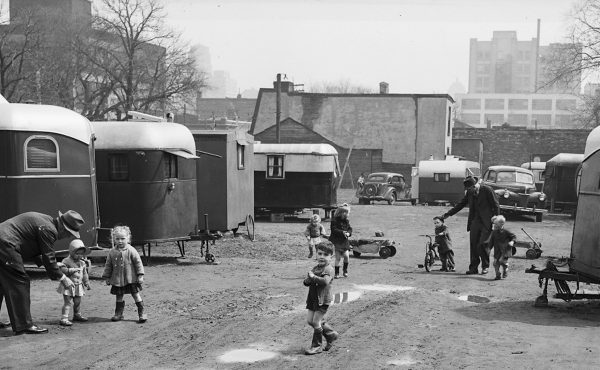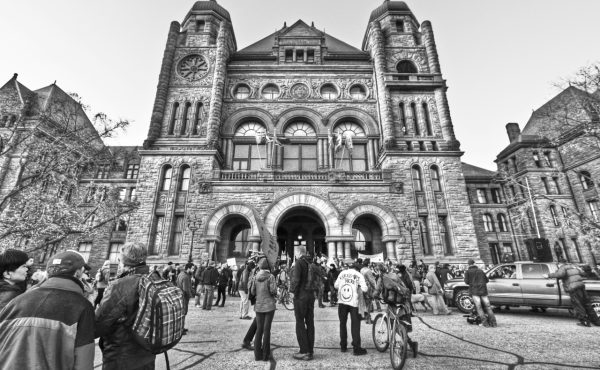If cities had New Year’s resolutions, Toronto’s should be a poverty reduction strategy.
According to the new report on child poverty released in mid-November [PDF], Toronto is home to five of the ten wealthiest neighbourhoods in Canada, while it also leads the country in poverty rates. We’ve made no significant progress towards reducing this hidden epidemic, and we are also one of the last municipalities to develop a plan to confront the crisis.
Much more troubling is the fact that Toronto — despite its role as the economic engine of the nation, and its enviable international rankings for resilience and liveability — is home to thousands of poor children: 29% overall.
So when it comes to taking action on growing income inequality, we have the right intentions but wrong execution. We are a city of task forces and conveners of roundtables. But what are we trying to achieve?
According to the City, the goal is to end poverty through a collaborative, community-driven strategy. That seems like an ambitious plan, but it doesn’t say much. Many of the income distribution policies that can make a fundamental difference in poverty rates are not within the city’s purview.
While Toronto has the tools, talent and institutional structures to alleviate the pressures of poverty, it has no control over the macro-level economic trends. But do we have the political and economic will to shift priorities — like fixing the housing backlog at the expense of delayed road repairs — in order to improve the overall living standards? I ask because the goal of achieving and maintaining an equitable quality of life for all Torontonians comes with a cost. Therefore, what might we be willing to give up, as a city, for the whole to be successful?
Surprisingly, there’s no consensus on what constitutes as poverty, let alone how to reduce it. Given that poverty is a multifaceted social phenomenon that afflicts thousands of people who hold down multiple, low-paying jobs, I will focus on role of the non-profit sector in helping to alleviate the hardships. Is the goal to merely mitigate the challenges of poverty, or can local governments and social service agencies actually help reduce the problem?
The answer depends on whom you ask. Denise Campbell, Toronto’s director of social policy, says the city’s strategy will not solve poverty on its own. “Place-based strategies can mitigate systemic inequality at the neighbourhood level, but it could not solve it. You cannot solve systemic poverty through a place-based approach.”
Campbell is well aware of the pressures of building resident capacity in an environment of public accountability: “The challenge we face is that people want immediate measures when it takes time to strengthen neighbourhoods and create opportunity for those who live in entranced circumstances. And that doesn’t happen over one program or funding structure.”
Another dilemma is the ongoing shift from a service-based to a knowledge-based economy. We are no longer clear about the pathways to earning a decent living. Going to university will not guarantee a job, just as employment will not free individuals or families from the cycle of poverty. So what strategy is going to be impactful, giving the shifting economic trends?
If we were to think of poverty as a system, we can understand how spatial inequality and poverty traps form in Toronto, as well as the macro patterns and trends of income disparity. But what are the structural forces that contribute to this problem? How do we, individually, allow this situation to persist?
Richard de Gaetano, from Social Planning Toronto, points to a 30-year shift in government spending, which has seen the downloading of responsibility for managing social problems, like poverty, to the local realm of charity and families. As economic cycles became shorter, waves of downsizing and layoffs created social pressures, such as housing shortages and food insecurity, which were relegated to the non-profit sector. But instead of focusing on why some people are poor, De Gaetano believes we should be asking another question: “If we all had what we needed, what would it look like? That would give us more of a sense of what’s wrong.”
The third-sector’s challenges are those that society has chosen not to deal with. If it were easy to find a stable job with living wages, then we wouldn’t need service agencies to feed the hungry and house the homeless. Yumi Hotta, who used to run the now defunct Frontline Partners with Youth Network (FPYN), believes that the lack of public discourse around inequality sets non-governmental service providers up to fail. She penned a personal note on the limitations of the charity model as well as the “one-time cash injections” funding structure, which fosters a culture of uncertainty among social service organizations.
“As the gap widens,” she told me, “so does the need, which intensifies the competition amongst non-profit groups due to less money going around.” Instead, this dynamic positions the non-profit sector as a buffer that effectively maintains the status quo — filling the gaps that are constantly widening without ever addressing the root causes or challenging the political system.
Maytree president Elizabeth McIsaac believes cities need to re-think how the not-for-profit sector strengthens communities. “We have an environment with many not-for-profits, each with multiple organizational pressures that can take their energy away from being great community leaders.”
When community agencies are unable to advocate and engage in the political discussion around the systemic roots of poverty, they may find themselves caricatured as spokespersons for the so-called poverty industry. At the end of the day, an agency can help someone find a job, but they cannot keep that person employed. This is why we cannot just rely on social spending alone.
If we want to reduce poverty, we need to deal with social inequality. When the majority of unadvertised work opportunities are locked in a hidden job market that is only accessible through social connections — who you know becomes more valuable than what you know.
Social capital, the personal relationships that help you achieve set goals, is both a pathway and a hindrance to prosperity. Chances are, if you’re a single mother, newcomer, or visible minority living in the inner suburbs, your social network will not help you succeed in the labour market. Therefore, we can’t lessen inequality without talking about access to opportunity, and we can’t improve access without having a frank discussion about privilege and barrier.





9 comments
While the city may not have much influence in income redistribution it does on the other side of the ledger. It could stop subsidising residential development by charging developers for the added costs to infrastructure.
According to the city, between 2013 and 2022 Toronto will be experiencing growth related expenses of 3.4 billion but only collect 2.4 billion from the development fees meant to cover them. Then there is the issue of subsidies in the operating budget. Renters in multi residential buildingscand commercial taxpayers art taxed 2.5 times the rate of residential taxpayers. To suggest the city cannot do more to help the poor is absurd.
Poverty is an issue that has not been “solved” anywhere in the world and really at any point in the history of humans. The reality is, some people are smarter than others, some people have better connections and social circles than others, some people are harder working than others, etc. All these factors make for inequality. The moral dilemma is how can we help those less fortunate, those who don’t have the connections, those who have physical disabilities, those who aren’t as smart as others, etc.? Then there is a whole other cohort who just don’t want to work and we as a society are supposed to help them? There are those who want to genuinely get themselves out and are down on luck but a majority is very comfortable having society help them out (not having to work or work hard and live the life they live).
The poverty “sector” is mostly a black hole. We’re pouring lots of money to “feed” those in need instead of concentrating more efforts into teaching them how to fish. The gap is only going to widen and there will just be more and more demands for money.
Sadly, you and the poverty industry place no responsibility on the individual.
True many work hard to work their way up, but far more don’t. Too many just have a long list of wants and feel totally entitled and justified while contributing very little. And taking up space, robbing assistance from someone else in need for generations.
Clearly the system is broken.
I do not believe a person or family that has enjoyed help for decades will change and become self sufficient. They know the game and play it.
Imagine how many others could be helped by cutting out the deadbeats and hangers on? And that may be the exact tough love and incentive the system abusers need and the managers and enablers need to start any forward movement.
To some I may sound harsh but we all know it’s the truth.
That is the hard decision our leaders need to make. Simply throwing more at the current system is unsustainable and NOT working.
Layton, thank you for reading and sharing your feedback. Much appreciated.
I am both in agreement and disagreement with you. I agree that the system is broken and that it doesn’t help anyone when progressives – people of my political ilk – sweep the many problems of the not-for-profit sector under the rug. I, for one, am not advocating for more money to be thrown at a system that is unsustainable – hence my conclusion.
I disagree with the rest of your generalization, mostly because the structure of your argument is based on a fallacy that is not supported by any existing data on the matter. But tell me, just how should we place blame on those 29% of children/families living in poverty?
TJ, thank you for reading and sharing your feedback. Much appreciated.
My article was not advocating that we solve poverty (that’s the City’s mission), rather that we need to discuss growing inequity, in order to reduce it.
It’s important that we differentiate ‘poverty’ from ‘inequality’.
“Poverty is a nuanced term, while inequality is a fairly fixed term. Inequality always describes an economic disparity (or lack thereof) between people. Poverty, on the other hand, can describe people who are sometimes poor, usually poor or always poor. Poverty describes a wide variety of ways in which inequalities can exist, while inequalities simply describe the underlying issue.”
http://www.ehow.com/info_8589268_difference-between-inequality-poverty.html
Now, back to your argument, it can be argued that poverty and inequality has existed since the beginning of time, so why the hysteria? It’s important to note that the basis of discrimination – for which inequality materialized – has evolved over time, from gender/race-based, to classs/education-based, and now social/human capital-based. At each instance, society has risen to challenge inequality through suffrage/civil rights movement and policy options like, affirmative action. Therefore, to suggest that we should just tolerate it is to deny the fact that poverty and inequality is intentional and man-made.
Burale Thanks for your reply but mine is not a generalization. For example, TCHC has at least 29% of its tenants staying over 10 years. Some are old and handicapped but not the majority according to TCHC.
Say 20% are not old, etc., that means that of a total tenancy of 60,000+, 12,000+ are there for too long. They are taking up spaces for those in need who are stuck waiting forever on lists that could be greatly shortened immediately. And this result could happen years quicker than building new for that same number.
And our funding could go much further, helping more, by spending wiser. For example, building in downtown Toronto, on the most expensive land costs more than decentralizing. Building hubs in other areas to better service clients versus the downtown practice.
Remember, we who support the system do so to help as many as possible in real need. It has nothing to do with trophy building, or shouldn’t.
Your singling out child poverty only perverts the discussion because the children are actually suffering at the will of their parents. And no authority or politician ever singles out the parents. This is wrong. Like it or not, and I don’t, many people have children and take no responsibility for them. So how to police it? How to eliminate the current abuse and incentive to merely have children to get more money and support while doing nothing to get out of the system? And is it really society’s obligation to adopt every child, and in so doing every parent, while the parent owes nothing in return to the child and society?
Obviously, some tougher choices need to be made but one thing is certain, simply giving these parents money forever which often goes elsewhere and not to the child can’t continue. When I grew up, parents were held responsible for the actions of their children under 18. Parents were also held liable for their own actions far more than today. Today if you have ‘nose tickling disease’ or any other combination of letters you can get away with murder. Or at least responsibility for yourself, your family, society, your debts, etc. I hope that is not what you are suggesting?
None of it is right, nor is it an individual’s right as too many believe. Our social network is meant to help those in need as a bridge NOT a lifestyle choice, which it has become.
Perhaps a return to original mandates and objectives is in order across the system. Clear out the deadwood and grey areas. Then there will be far more room in the system available to help others really in need.
Idil Burale
I appreciate the article. I purposely left out the man-made inequality and instead, wanted to concentrate on inequalities such as some people are smarter than others, some want to work harder/study, etc. I don’t think we can solve man-made inequalities in our lifetime and perhaps, that is part of human nature now. Sometimes, I think gender/race, class/education, and social/human capital-based inequalities are inherently built-in excuses for some of those who are either not smart, hard working enough, etc. because you need individuals to change themselves. Having friends and acquaintances who are categorically living in poverty and having worked previously in this sector, I’ve seen first hand in my experience that many simply want to take handouts and drift through life doing as little as possible. These types of individuals lie, cheat, steal, and kill in order to continue to live the life they live and are consciously making decisions to do that.
Inequity will continue to grow and a city, province or country cannot do enough to reduce it. I believe it has been built and entrenched into our society. Even in communistic countries and societies, you have significant inequality. At the same time, I am 100% aware that innocent children did not choose the life they are in and that these children grow up to be adults that simply don’t know any better or any different. I want to help change that but like I said, too much effort is being put into “giving” instead of “teaching”. Charity has become too permanent a fixture rather than an occasional item. People live on charity. Food banks are great for those in need but we simply can’t always have the same people in need all the time and with an ever growing list. The onus should also be on parents to be able to provide for their children as best as they can. Those in the lower income brackets, historically, have generally been the ones with highest birthrates. They simply have more children than they can afford/provide for which contributes to the 29% of child poverty. Isn’t that one of the major starting places too, education?
Layton, it seems you’ve given this considerable thought. You actively want people to be improving their lives and in doing so, making room for others who need help. But I think you’re missing a major piece of the puzzle: being on government assistance is nearly impossible.
2013 rates show a single parent with two children under 17 years old would get about $1,194 monthly. You’re unlikely to be able to afford rent for a one-bedroom apartment anywhere in the city on that, much less something suitable for three people. And that’s not including basic bills or TTC passes (since you’re out on the edge of town, prepare to spend lots of time and money on the TTC). Lord help you if you can get a job – daycare is about $2k a month in Toronto. Many two-parent households where both parents make a reasonable amount of money struggle with this balance.
http://www.nlstoronto.org/uploads/4/4/3/9/4439251/social_assistance_rates_updates.pdf
So before we even touch on what a person can do to improve their situation and that of their family, let’s cut the nonsense: if there are people living on peanuts, sitting on their arse all day not pulling their weight, they aren’t doing it on the public dime. Or the system has been set up that it’s more logical to stay home – if you’ll only bring in $200 bi-weekly from your job but your assistance will be cut by $300 a month and you’ll have to pay a sitter $200 a month to watch your kids while you’re gone, what are your options?
The misconception that there’s a part of our society that actually chooses to not make ends meet every single month has to stop. The reality is, decent jobs are hard to come by. Many people will have to work low-paying jobs so they can put food on their table. If they’re lucky, their first job will leave them time for a second job. People want a reason to separate themselves from poverty if they aren’t living in it. They want to believe that with their work ethic and reasoning skills, they’d never get trapped. But many Canadians are just a few bad months away from having nothing with nowhere to go. Throwing your hands up and saying ‘oh well those people aren’t even trying’ is just one way to render the situation inert.
LO
If you truly believe there is no way out then why try to solve the problem at all?
Based on your comments there is a very real difference between us. I am positive people can help themselves with some assistance, you don’t. Or, you don’t have much hope.
I’ve always lived and taught my children to try even in the face of failure. Giving up is too easily a habit. Everyday we hear of someone, some group, etc. breaking free of the ‘assistance’ and feeling so much better for it. And feeling so much better about themselves as well.
It can be done you just have to have the desire, PMA and keep trying. Otherwise, stop complaining and demanding everyone else take care of you.